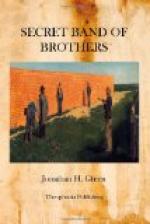They now came to the conclusion that those papers had been given to the officers of the bank, and were deposited in the clerk’s office of the United States court, to be used against them at some future day. They offered rewards to several of the inferior grade, for the purpose of getting possession of the box containing the plates, counterfeit money, and, as they supposed, the lost package. Their only hope now lay in getting that box. The time of Taylor’s trial had been fixed. Mr. Munger informed me I could leave the city for a few days, and he would let me know when my services were wanted. I went to Bayou Sara, one hundred and fifty miles above New Orleans. A few days after my arrival, Mr. Munger came after me in great haste, bringing the information that a great and daring burglary had been committed the same night I left the city. The clerk’s office had been entered, and the box, containing Taylor’s indictments, plates, and spurious money, had been taken. Taylor’s jury had not agreed, and he would get clear, in case the box could not be recovered. He informed me that I had been suspected and accused of the deed; but that he knew I was innocent, for he had inquired of the boat, and found I had left on the previous night, some time before the robbery was committed. He did not wish any one to know that he had any knowledge of my location, but told me I had nothing to fear. Indeed, I knew I could prove an alibi by more than one person, and I consented to return. While on our way back to the city, I told Mr. Munger I did not wish to go into the prison where the younger Brown was confined; I feared he had some designs upon my life.
“Do not have any apprehensions,” said he, “on that account. You will not be hurt, for you will be put into the debtor’s apartment, where Brown is not permitted to visit, and of course can have no chance to do you an injury.”
I was placed in prison upon my return—a position of greater safety to me than any other. Being assured by Mr. Munger of protection, I went without hesitation—expecting to be released the next day. The next morning I was brought out and informed, to my great surprise, that if discharged I must furnish a very heavy bail. This was a source of alarm; but my friend calmed my fears, by saying that all would be right when I was examined; that the excitement was great, and it was only necessary to wait for the return of the Lady of the Lake—which was on a trip to Natchez, and would be back in a few days—when abundant evidence in my favour would be secured, and I would be acquitted.
In a few days, I was accordingly set at liberty. The plates and papers had been found in Natchez, and a man by the name of King had been arrested—who confessed the crime, but alleged that he had been hired by a certain party to do the deed. This King was one of the brotherhood, and had been employed by the committee of Grand Masters to enter the office and secure for them the box, by which they expected to obtain the package. In this they were mistaken, and placed in a worse dilemma than before.




